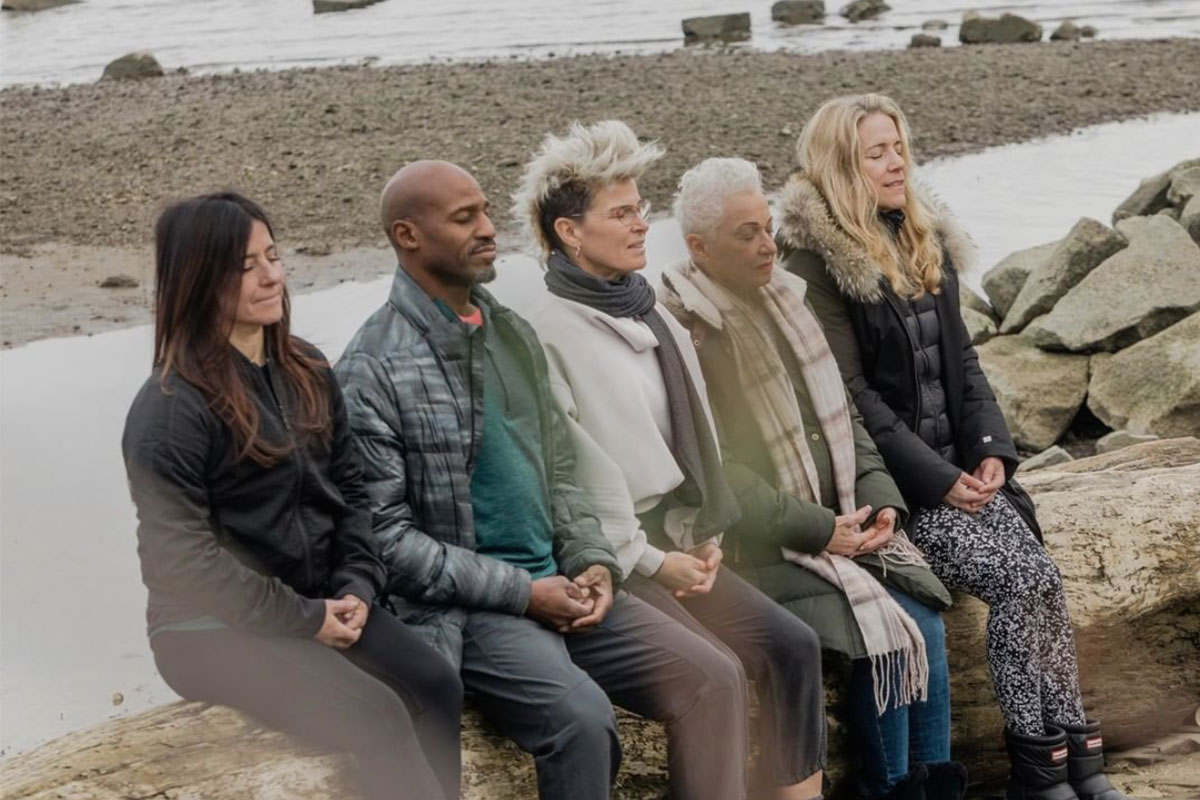
Right now, you might feel as if you’re bouncing from one emotion to the other, or getting overwhelmed quickly as news of the coronavirus pandemic fills your screens. Meditation, the practice of training one’s mind to divert stress and anxiety and bring calmness through breath and physical presence, has been proven to help stressful situations, especially through uncertain times like these.
If you’re looking for ways to start, keep reading. We spoke with Gina Rollo White, CEO and founder of Mindful Junkie, who works directly with the first responders and health care workers on the front lines of the spread of COVID-19. Not only is she offering free online mindfulness meditation sessions, she’s also giving you the simple tools to create a new and healthy habit to use now and in the future. Highlights from our conversation are below.
When did you start practicing meditation, and what made it stick in your life?
I have been teaching mind-body interventions for over 15 years and have focused on mindfulness for the last six years. My mindfulness practice began with my own meditation practice (sitting and doing a meditation), as well as a ton of research, taking as many courses as possible. I started seeing impactful benefits in my own life; my internal tension was decreasing, I was able to deal with daily adversities better and I was feeling happier. These outcomes got me really interested in understanding how mediation actually affects the brain—taking it from a chaotic to a calm state. I realized I wanted to share mindfulness strategies with others, but first I needed to better understand the intersection of mindfulness, stress regulation and the brain. I landed in graduate school where I earned my master’s degree in mindfulness.
During these uncertain times, more people are seeking that ability to have a sense of calmness amidst the chaos. What would you want people to know who are just starting meditation or are interested in starting?
The hardest part about starting a meditation practice is “starting.” Most people have two psychological barriers to mediation: The first is that it is “new age” or only for hippies, and the second is that it requires sitting motionless for long periods of time with an empty mind. Mindfulness meditation makes mediation approachable for everyone. It simply asks the meditator to notice what is occurring. If you start thinking while you’re meditating, then you just notice that you’re thinking. It is OK if your mind wanders; you just notice it. Mindfulness is about awareness of your thoughts, awareness of your feelings, awareness of your threshold. It is the “noticing” that is important. Your mind doesn’t need to be blank. (By the way, I’m pretty sure I’ve never had a “blank mind” longer than half a second while meditating.) One other barrier often mentioned is time. People think you have to sit for long stretches of time in order for it to be “real.” A few minutes of meditation a day is very effective. Start with five minutes (or even three minutes!), it doesn’t matter. Do what works for you and build from there.
Why do you think meditation is important in times like these, just as much as it is during our normal, everyday lives?
When we are under high stress, we get sick easier, we don’t sleep as well, we are agitated and, sometimes, we are just flat-out mean. Chronic stress can be debilitating. It is so important during high-stress moments, like now, to have strategies that calm our nervous systems. Learning to regulate our emotional state allows us to remain emotionally and physically healthy.
Mindfulness can support a healthy lifestyle during this crazy moment, but it also helps during typical times too. Mindfulness training can help your brain avoid thinking something is an emergency—you missed a work deadline, you had an issue with your partner, you didn’t pay a bill on time—when it’s not. While these are all important things, sometimes we react as if they are emergencies, and the outcome is unhealthy. Training your mind to differentiate between an actual emergency and something that is just annoying the heck out of you is really important. Mindfulness teaches you to notice the difference and regulate your heightened state by inserting a practice like taking a breath, listening to a sound or noticing a body sensation.
What are the benefits of meditation that you believe should help people stick to it?
Meditation improves mood, reduces anxiety, fine-tunes attention, improves cognition, increases ability to feel empathy, increases resilience, reduces feelings of loneliness and increases compassion for self and others.
Talk about your approach to the COVID-19 outbreak, and how you’re reaching out to the community through meditation.
COVID-19 has us living in constant stress. Creating patterns in our lives can help to regulate our stress. It’s helpful to find moments of gratitude, moments of solitude and moments of community. Community is particularly important right now. Everyone is feeling isolated and uncertain. In response to the high stress of our COVID-19 situation, I am trying to do my part to help anyway that I can. I am delivering two live mindfulness sessions every day. I am partnering with Nancy Belmont from Breathr VR to deliver 10 minutes of conversation and mindfulness practice live daily for everyone. I am also leading daily live mindfulness sessions for the group that forms the front line protecting us from COVID-19: first responders, fire services and medical professionals. Both of these are brief, micro-mindful moments. They are easily accessible via Zoom, Facebook or Instagram. And they offer a quick reprieve and strategies for stress regulation.
I have also developed a three-part daily mindfulness practice during isolation:
- Morning: Before you even get out of bed is a great time to do a gratitude check. Maybe you want to go over a list of things you’re grateful for, maybe you want to do a three-minute meditation on accepting things the way they are, and feeling at peace, or maybe you want to send love and kindness to those that are sick or in fear.
- Middle of the day: Finding some time in the middle of the day where you can sit and not think about stressful things is very important. Find a chair or a corner that you have designated as your “mindful corner.” This is a place where you specifically choose to not do stressful things. Maybe you read a book for 10 minutes, maybe you watch your favorite Netflix show for 10 minutes, maybe you knit. If you live with others, designate this place as a stress-free zone. You cannot be bothered when you’re there. If you live by yourself, remind yourself that this is a stress-free zone, and avoid engaging in stressful things (like reading the news!).
- Evening: Join some type of community mindfulness. If you were in a house of people, take three minutes to just sit in silence together and breathe. If you live by yourself, reach out to someone you know via phone, or FaceTime or a Zoom call. If you live with pets, spend some time silently with your pets.
If you were to give someone the super-quick rundown on how to get themselves set up for a meditation practice, what would they need to know?
- Start small: Five minutes daily. Meditating for super-long periods of time does have benefits, and so does meditating for five to 10 minutes a day. Studies suggest that five minutes of meditation a day helps to train the brain to calm in moments of stress and anxiety.
- Create a habit by adding/linking meditation to an existing routine. For example, let’s say you wake up every morning and turn on the coffee pot. While the coffee is brewing, take that time to meditate. Or, let’s say you have lunch everyday at noon, meditate for five minutes before lunch. Maybe you shower in the evening. Before taking a shower, sit for a few minutes. The idea is to create a new habit by linking it to an existing habit. This helps to remind you to do it.
- Reward yourself. Studies also suggest that positively reinforcing a behavior makes the behavior stronger and stickier. After you sit/meditate, make sure to congratulate yourself. Maybe say something like “Good job taking care of me today,” or “Wow, I sat for five minutes, that was great!” or just a simple “Thank you,” to yourself.
Is there anything else readers should know about meditation in general, or meditation at this time?
We all could use tools to help regulate emotions right now. We seem to be constantly going from happy to sad to grateful to frustrated to acceptance to anger. Moving constantly between states can be emotionally draining. Mindfulness helps us identify that we are bouncing around, helps us to find what is tolerable and what is not, and also teaches us to find some calm during the storm.
For more on how the spread of COVID-19 is affecting the Northern Virginia region, please visit here. For more health-related stories, subscribe to our weekly Health newsletter.




